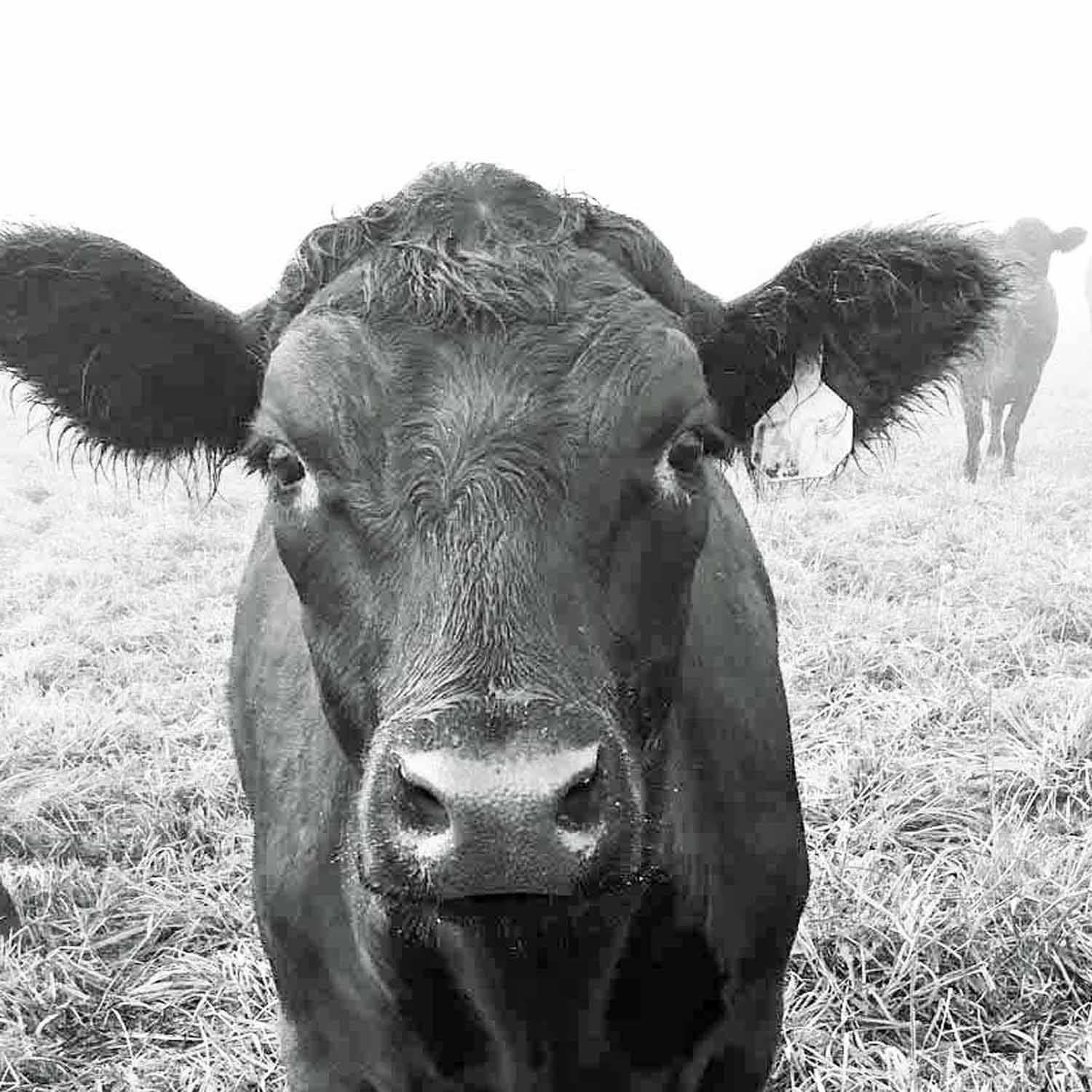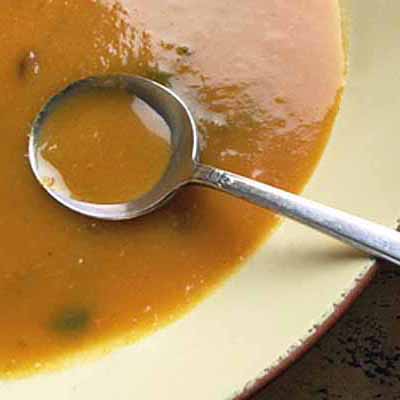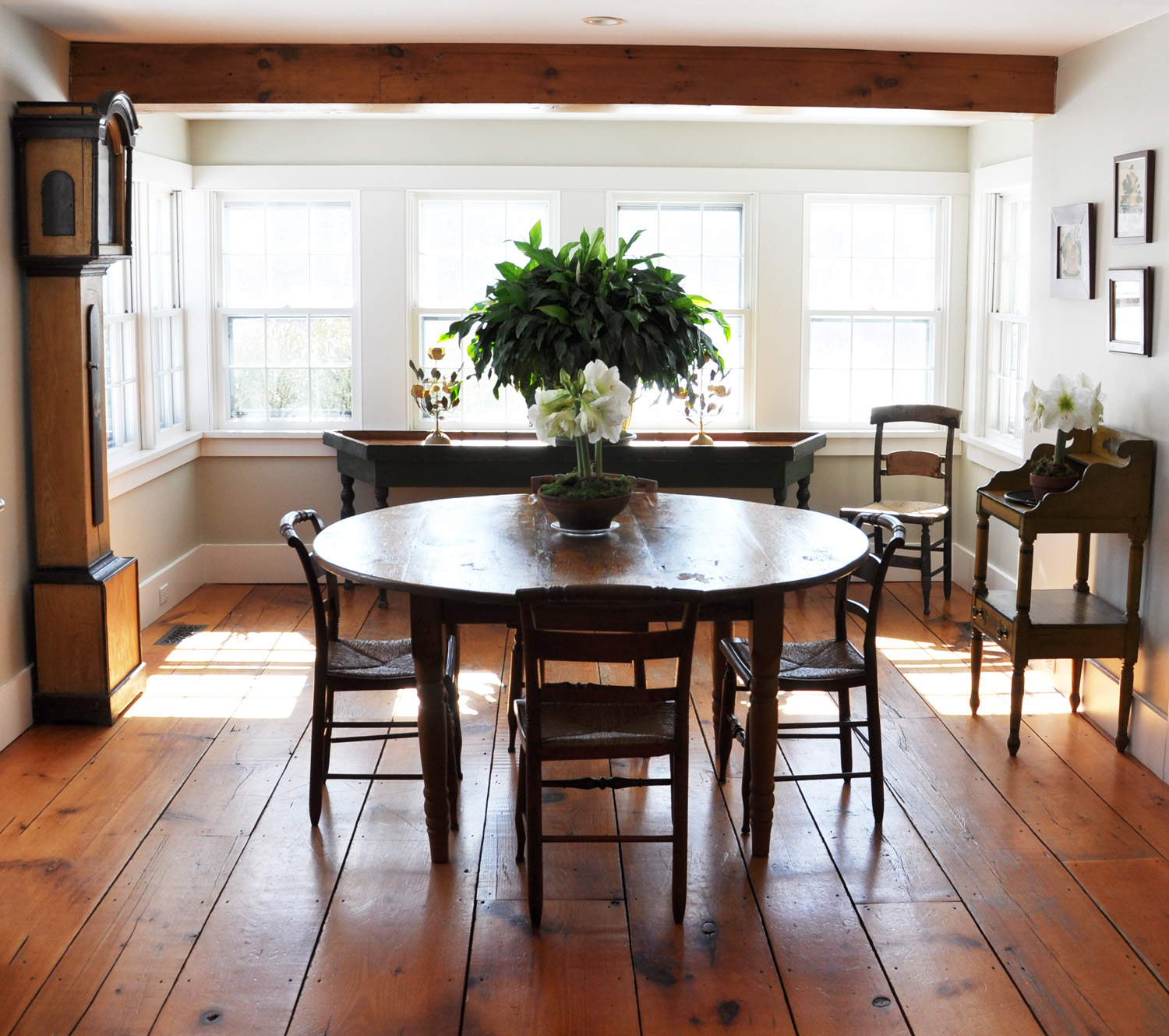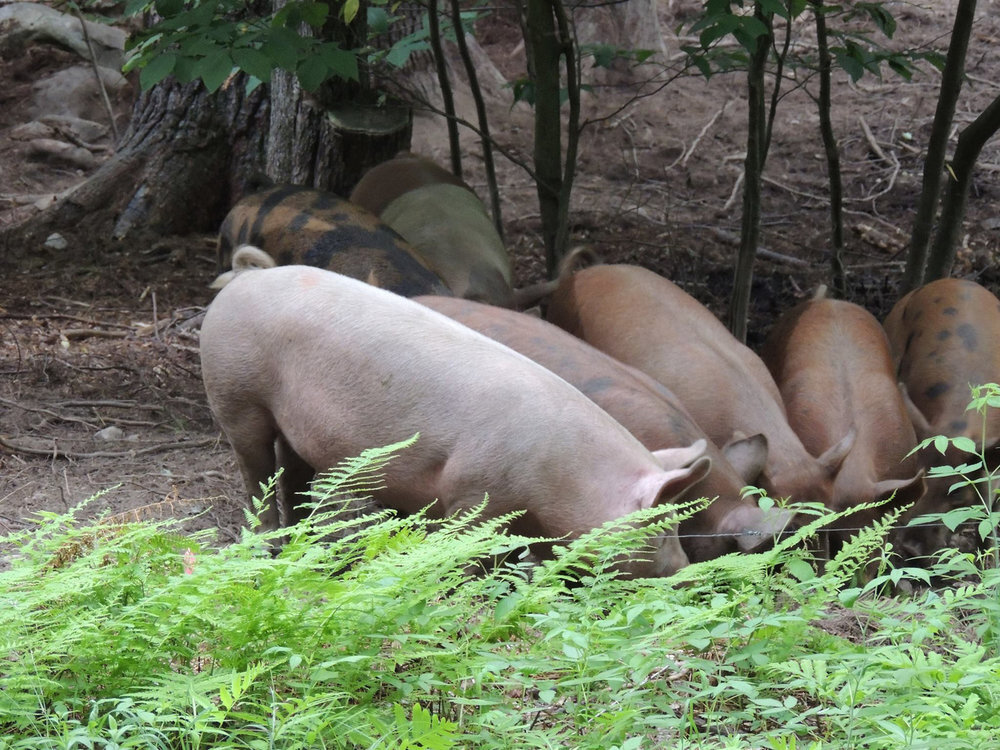LOCAL EGGS: TASTE & QUALITY
LOCAL EGGS: The Taste Test and the Quality By Judith Lerner (Published 2010) [For more articles by Judith Lerner, link here.]
So how about those local eggs? Are they worth all the hoopla?
Suky Werman, co-owner and innkeeper with her husband Tom Werman of Stoneover Farm Bed & Breakfast in Lenox swears by the deliciousness of the eggs she gets from the 11 Rhode Island Red and Sussex hens — and one very territorial rooster — she has been keeping for the last six years.
"We feed our eggs to our guests and we eat the eggs. We can really tell the difference. Anyone who tastes them or looks at them can tell the difference," she said.
They use their eggs as the basis for the breakfasts they feed their guests.
"Tommy makes these delicious omelets; we call it the Tomlet and we use local Rawson Brook Monterey chevre or lots of mushrooms in the Tomlet. Its quite a wonderful," she concluded.
Do they feed their chickens special feed? Organic feed? Locally-made feed?
"Not organic feed," said Tom Werman. "We feed them cracked corn and layer pellets and everything the guests don't eat that's left on their plates — especially in the bread family," he said.
And the chickens get to freely run and peck outside as soon as winter has gone.
At Taft Farms, in Great Barrington owned by the whole Tawczynski family, Paul Tawczynski said the breakfast sandwiches, using the farm's own Barred Rock and Red Star eggs (on bread they bake from grain they raise themselves) every morning, are so popular they had to buy a bigger griddle to prepare them.
"We get a pretty good following and we had to increase our capacity. People are willing to pay a bit more," Paul said, "when they know they are getting local food."
"Our own eggs have an incredibly rich flavor compared to the ones that you buy in the supermarket," he said. "A fresh egg stands up in the pan it does not spread out when the bird is laying a healthy egg."
Taft Farms pastured chickens eat lots of produce scraps from the farm store and poultry feed mixed by R & R Wirtes Farm in Lanesborough. "Strawberries, tomatoes and apples, those are their favorites," Paul said.
I called Mike Cahill, director of animal health at the Massachusetts Department of Agricultural Resources to check on state rules for selling and serving local eggs.
After doing some checking he got back to me and said, "My understanding is that ungraded and unsized eggs, as long as they are kept refrigerated at 45 degrees or less, can be transported within state lines. There is a lot of openness as long as they come from an approved source. When you are talking about ungraded and unsized eggs any source is considered approved, even by the United States Department of Agriculture."
This means that Massachusetts law allows farmers can bring their unsized, ungraded eggs to farmers markets to sell and to restaurants to buy and serve.
Most local farmers and backyard poultry raisers do not grade their eggs for size or quality. They are required to prepare them for sale by cleaning them, packaging them in clean containers and keeping them at the proper temperature.
Brian Alberg, food and beverage director and executive chef at the Red Lion in Stockbridge, uses eggs he gets locally from Bridgette Ruthman's Joshua's Farm in Sandisfield for his sustainable breakfast menu, desserts, quiche and for the popular egg salad sandwiches they make for the Norman Rockwell Museum café in season.
"They are extremely more flavorful [than commercial eggs]," Alberg commented. He appreciates that local eggs are, "usually raised in and out side, so they can roam and do their thing, rather than just sit in cages under a roof."
Ruthman raises Araucana, Bantam and Barred Rock chickens so her eggs have blue, chocolate, brown and white shells. Her chickens are free range foragers who love local produce including apples and whole grains.
David Long raises a number of breeds of chickens that he varies each year on his old family Maiden Flower Farm in Housatonic. He makes sure to have Dutch Welsummer chickens for Matt Rubiner to use for softboiled eggs that Rubiner serves in his Rubi's Café in Great Barrington. The really dark shells of the Welsummer eggs contrast impressively with the brightly golden yolk and the white when the egg is presented in a cup with the tip snipped off.
"In Rubi's Café we use local eggs exclusively. We never use anything but," Rubiner said emphatically. "Our most elaborate dish we do is a soft boiled egg [using Long's Welsummer egg] and when you eat a soft boiled egg it has to be good."
Long's chickens forage on what he calls "wholesome garbage" from local eateries including Berkshire Co-op Market, Daily Bread and Rubiner's Cheesemonger.
"One of the tenets of this farm," Long told me, "is we're a net importer of wholesome garbage and a net exporter of wholesome food. We're picky about our garbage but there's plenty to go around."
Each chicken, poultry and fowl farmer has her or his own method of feeding, housing, protecting and presenting their flocks.
Billie Best, called The Egg Lady by her peers and customers, raises a small flock of 35 to 50 Araucana, Buff Orpington and Barred Rock chickens at her Crazy Wife Farm in Alford. She keeps meticulous records to discover patterns of egg-laying among her brood.
She has noticed over the seven years she has kept her records that, "winter solstice to summer solstice is [the chickens'] heaviest laying time. They do not necessarily stop laying in winter."
What she found it that chickens stop laying when they molt, "which they do slowly, one feather at a time. They stop laying during that time which may last two or three months."
"I have chicks just hatching now [in mid April]," Best said, "who will be seven month old in November so winter will be their chief production." The chickens she now has who hatched last July will begin their heaviest egg laying next mid-winter to augment the new chickens.
While other poultry farmers lose their birds to hawks and other flying predators, Best has allowed bushes and trees to grow up close to her house which is also where the chicken house and barnyard are. She works from her home so she is there to see and hear what is happening with her birds wander wherever they want to go all year round. While chickens are snow-blind, they will venture outside in winter if they think they see something tasty there.
"I have a really free range flock and raising them artisanally involves lot of attention on my part. I provide them with very wooly permaculture so there is something to get under if a hawk flies in. They more often choose to stay on the edge of the woods, near the house. There are lots of trees around the house and in the landscape which is getting woolier and woolier, lots of natural buffers around the barnyard."
"Especially with a free-ranging flock it is good to have as many roosters as the flock can tolerate; a good rooster is a vey effective alarm system," warning the chickens, the dog and herself of potential predators, Best noted.
She also walks the perimeter of her property twice a day with her new young dog. "I'm training him to be a livestock guardian dog but he is not a Great Pyrenees, he is a house pet." Best believes a combination of the dog's bark, his presence and his scent will discourage predators like foxes that have been a problem on her farm.
"I may lose 10 birds a year, mainly to fox," she said.
Ken Wirtes said his pastured chickens are preyed on by, "coons and hawks. Especially hawks," at his Bradley Farm in Lanesborough.
"We erected a greenhouse, a covered tent that's fenced in," to solve the problem.
"As far as restaurants are concerned," Wirtes said of the quality and safety of local eggs, "those guys are pretty fussy, anyway. They don't want a stale egg no matter where it's coming from."
Dominic Palumbo has been farming at his diversified Moon in the Pond Farm in Sheffield since 1991. He is known for the high quality organic, heritage and sustainable meats he produces. He also raises poultry and supplies his farm and farmers market customers and Rubiner's Cheesemonger with eggs: chicken, duck and goose. Next year he will experiment with offering turkey eggs from the flock he is now incubating.
His birds hang around free-ranging near his house where, according to Palumbo, "It's a circus. A lot of activity seems to keep the hawks at bay — dogs, people that's what Moon in the Pond has going on."
His Khaki Campbell ducks lay eggs "virtually year round. Chicken eggs have a season," he said. "It's very difficult to get chickens to lay in the coldest months. The ducks slow down but they don't stop. We're very lucky that we have a great supply as the year goes on."
"They have a wonderful flavor," Palumbo added. "Some of our customers have switched over totally from chicken to duck eggs."
Geese produce eggs only in early spring. "We are getting the last of the goose eggs right now [mid April] and they will be available only for the next couple of weeks," he said.
"Both goose and duck eggs are preferred for baking," he said. "The whites are strong so they beat very well, They add a lot of loft so are preferred by European bakers."
Sean Stanton, pastures about 700 heritage breed hens (and a few roosters) on his North Plain and Blue Hill Farms in Great Barrington.
"They are being taken care of and they have a nice life," Stanton said.
"We're big enough that I don't get to know each chicken personally like some backyard farmers do but, on the other hand, we're small enough that the chickens get [fenced] pasture-access from their houses on wheels."
Chickens are an integral part of the cycle at Stanton's organic farms.
"As cows are grazing chickens will follow and clean up the pasture," Stanton explained. "This benefits the cows because the flies don't have a chance to repopulate. Cowpies attract the flies and the chickens pick the cowpies apart [to get at the flies] which spreads the manure naturally."
"This may not sound appetizing," he said, "but this [eating the flies] is why the eggs taste good."
Stanton sees egg production in the simplest way.
"Here's the thing about eggs," he said. "For the money they're a great nutrient-dense food and, also, a whole food."
Nancy Intres has about 40 hens and two roosters at Bear Meadow Apiary that she farms with her husband Rick Intres in Ashfield. Both Stanton and Intres extend and brighten their birds' winter days with electric lights in various ways. Her flock is small enough, however, that she does, as Stanton referred to, get to know her chickens.
"It started out so my husband and I could have farm fresh eggs. I never thought it would turn into a business."
"I love my chickens," Intres said. "They become habit forming."
She observes them closely.
"I know them pretty well. Each group that I raise have their own little language; they coo to each other."
"People don't know this about chickens," she concluded. "They're underestimated."
A NUMBER OF LOCAL EGG PRODUCERS AND OTHER RESOURCES
BEAR MEADOW APIARY, (413) 628-3970, Ashfield, Rick and Nancy Intres, sold at farmstand and Berkshire Organics, fenced naturally-fed local feed, 38 hens, 2 roosters, mixture of Araucana, Barred Rock, Rhode Island Red, Silver-winged Wyandotte, since 2005
BRADLEY FARM, (413) 499-1012, 545 North Main Street, Lanesborough, Kenneth Wirtes, Sr., sold at store and Berkshire Farmers Market, fenced free-range, fed R&R Wirtes poultry feed, 50 hens, many breeds including Ameraucanas, Bantam (roosters), Black Rosecomb Bantam, Black Tailed Japanese, Seabright, Sex Link, since 1960
BRATTLE FARM, (413) 499-1476, 600 William Street, Pittsfield, Donna and Bill Chandler, sold at farm, free-range naturally-fed, 40 hens, 1 rooster, Ameraucana, Brahma, Dark Cornish, since 2007, 4-H club meeting
CRAZY WIFE FARM, (413) 644-8971, 16 White's Hill Road, Alford, Billie Best, sold at farm, Egremont General Store, used at Stagecoach Tavern, 35 to 50 hens, 2 roosters, Araucana, Buff Orpington, Plymouth Barred Rock, since 2004, call for more details from her seven years of records on egg-laying patterns, providing safety, seasonal foraging and more
CRICKET CREEK FARM, (413) 458-5888 1255, Oblong Road, Williamstown, sold at farm store,] always a farm, modernized 2003
FEATHER RIDGE FARM, (845) 756-2381 47 Bogdanffy Road, Elizaville, NY (25 miles west of Great Barrington in Colombia County) Steve Bogdanffy and family, widely sold at area stores including Green River Farms, Williamstown, Lanesboro Supermarket and The Old Creamery, Cummington, USDA-inspected, free-running, fed Feather Ridge antibiotic, hormone and byproduct-free Farm-milled whole-grain feed plus flaxseed and alfalfa meal, 10,000 Rhode Island Red hens, since 1938
GOULD FARM HARVEST BARN, (413) 644-9718 54 Gould Road, Monterey, C.J. Walton, sold at barn, 300 hens
HIDDEN PASTURE FARM, (802) 823-7873, 350 Quarry Hill Road, Pownal, VT, Fiona Harrar and Seth Hanauer, sold at farm call first, fed locally grown non-GMO grain & organic kelp, French Poulet Rouge
HOLIDAY BROOK FARM, (413) 684-0444, 100 Holiday Cottage Road, Dalton, Desiree and Jesse Robertson-DuBois, sold at farm store and to Brix Restaurant in Pittsfield for their Sunday brunches, 60 hens, Araucana, Black Star, Brown Leghorn, Feather-Footed Brahma, Red Star, Speckled Sussex, White Wyandotte, since 2007
JOSHUA'S FARM, (860) 671-0327, 45 Dodd Road, Sandisfield, Bridgette Ruthman, sold at farm, used by Red Lion Inn, free-range foraging and natural whole grain fed, hens, roosters, Araucana, Bantam, Barred Rock, since 2008
LEAHEY FARM, (413) 446-6959, 37 Reservoir Road, Lee, Phil and Jen Leahey, sell at farm and The Green Grocer, Lee
MAIDEN FLOWER FARM, (413) 274-6628, 304 North Plain Road, Housatonic, David Long, sold at farm and to restaurants, free-range, foraging also fed vegetables, and organic poultry feed, 125 to 150 hens, Colombian Wyandotte, Dutch Welsummer, French Maran, Rhode Island Red/Australorp hybrid, Speckled Sussex, since 2003
MICHAEL CAHILL, director of animal health at the Massachusetts Department of Agricultural Resources, (617) 626-1794, for any further questions
MIGHTY FOOD FARM, (802) 823-0102, 549 Cedar Hill Road, (4 miles over the border) Pownal, VT, Lisa MacDougall and Chuck Currie owners and farmers, fenced rotational grazing and local certified organic grain, 300 laying hens, 10 roosters, 150 chicks and 50 eggs in incubation, Araucana, Bantam, Barred Rock, New Hampshire Red, since 2007
MOON IN THE POND FARM, (413) 229-3092, 816 Barnum Street, Sheffield, Dominic Palumbo, duck/goose eggs sold at farm, farmers markets: Wednesday Nutrition Center, Great Barrington, Friday Sheffield, Saturday Millerton, NY and Rubiner's Cheesemonger, Great Barrington, free-range fowl fed certified organic feed, 50 laying hens, 35 ducks, 12 geese, New Hampshire chickens, Khaki Campbell ducks, Pilgrim geese, (Narragansett turkey eggs will be for sale in 2011), since 1991
NORTH PLAIN FARM & BLUE HILL FARM, (413) 528-2092, 205 North Plain Road, Great Barrington, Sean Stanton, sold at farm, Berkshire Co-op Market, Guido's and Rubiner's Cheesemonger all in Great Barrington, 700 hens, roosters, Ameraucana, Barred Rock, Buff Orpington, French Maran, Rhode Island Red, since 2002 PioneerValleyBackyardChickenAssociation.weebly.com is a website based in Williamsburg with nearby resources, consultations, events and a hotline for chicken farmers.
RIVER VALLEY FARM, (413) 822-9621, 345 New Lenox Road, Lenox, Lisa Dachinger, sold at farmstand, natural free-range eggs, 50 hens, 7 roosters, Araucana, Barred Rock, Black Java, Buff Orpington, California White, New Hampshire Red, since 2000
TAFT FARMS, (413) 528-1515, 119 Park Street North (Route 183), Great Barrington, Daniel Tawczynski and family, sold at farm store, pastured and fed local grain, 50 hens, 1 rooster, Barred Rock, Red Star, since 1955, also variety of breakfast egg sandwiches 8 to 11 daily
R & R WIRTES FARM, (413) 443-3881, 705 South Main Street, Lanesborough, producers of locally mixed animal feeds with s











